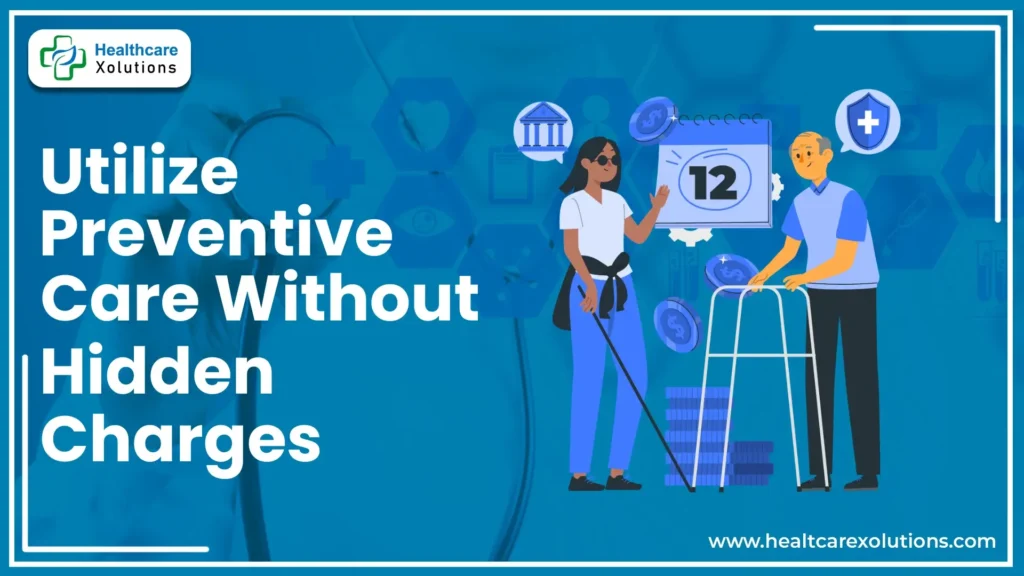How To Utilize Preventive Care Without Hidden Charges?

Preventive care is crucial for maintaining health and avoiding expensive medical interventions. Services like annual check-ups, vaccinations, and screenings detect health issues early and reduce long-term risks. However, hidden charges can deter individuals from fully utilizing these benefits. This guide will show you how to make the most of preventive care while avoiding unexpected costs.
Key Takeaways:
- Verify Coverage: Understand your insurance plan’s preventive care benefits and limitations.
- Stay In-Network: Choose in-network providers to avoid out-of-pocket costs.
- Clarify Services: Differentiate preventive care from diagnostic services to ensure full coverage.
- Request Itemized Bills: Check for errors or misclassified charges and dispute them promptly.
- Plan Ahead: Schedule appointments early to ensure compliance with insurance terms.
Table of Contents
What is Preventive Care?
Preventive care includes medical services designed to prevent illnesses or detect them early. Examples include:
- Annual Check-Ups
- Vaccinations
- Screenings: Blood pressure, diabetes, cholesterol, cancer (e.g., mammograms, colonoscopies).
- Routine Pediatric Services: Immunizations and developmental screenings.
Under the Affordable Care Act (ACA), most insurance plans in the U.S. must cover these services at no additional cost when performed by in-network providers.
How To Utilize Preventive Care Without Hidden Charges: Key Steps
1. Verify Your Insurance Plan:
- Review your policy for covered preventive services and their frequency.
- Contact your insurer to clarify doubts about coverage or terms.
2. Choose In-Network Providers:
- Use your insurance provider’s directory to locate in-network doctors and clinics.
- Confirm that your provider accepts your insurance and classifies the service as preventive care.
3. Schedule Preventive Services Wisely:
- Ensure annual exams are scheduled at least 12 months apart.
- Verify with your provider if follow-ups or additional tests are preventive or diagnostic to avoid extra charges.
4. Clarify the Scope of Services:
- Preventive services may transition to diagnostic if abnormalities are found.
- Always ask for cost confirmation before agreeing to additional tests.
5. Request Itemized Billing:
- Request a detailed bill and compare it with your insurance benefits.
- Dispute errors with both your provider and insurer promptly.
6. Understand Cost-Sharing Exceptions:
Some preventive services might incur charges due to:
- Out-of-network visits.
- Mixed appointments combining preventive and non-preventive services.
- Services not recommended by the U.S. Preventive Services Task Force (USPSTF).
Tips to Maximize Preventive Care Benefits:
- Plan Early: Book appointments early in the year to ensure availability.
- Use Online Tools: Many insurers provide tools for tracking preventive care benefits.
- Stay Informed: Familiarize yourself with USPSTF recommendations to identify qualifying services.
Preventive Care vs. Preventative Care:
The terms preventive and preventative are often used interchangeably. Both refer to measures that prevent disease or detect it early. However, “preventive” is more commonly used in professional contexts, including the ACA guidelines.
Conclusion:
Preventive care is a vital step toward safeguarding your health and avoiding costly treatments. By understanding your insurance policy, staying in-network, and clarifying service classifications, you can maximize your benefits without hidden charges. Take control of your health today with informed decisions and proactive planning.
FAQs:
What is preventive care, and why is it important?
Preventive care includes services like check-ups, vaccinations, and screenings to detect and prevent diseases early, promoting long-term health.
Are all preventive care services free under insurance?
Not always. Services must meet ACA guidelines and be performed in-network. Additional diagnostic tests may incur costs.
What should I do if I receive an unexpected bill for preventive care?
Review your explanation of benefits (EOB) and contact your insurer and provider to resolve billing issues.
What is considered preventive care under insurance?
Preventive care includes annual exams, vaccinations, screenings, and services recommended by the USPSTF.
How can I ensure my preventive care services are fully covered?
Stay in-network, confirm coverage details beforehand, and request itemized billing to avoid surprises.
